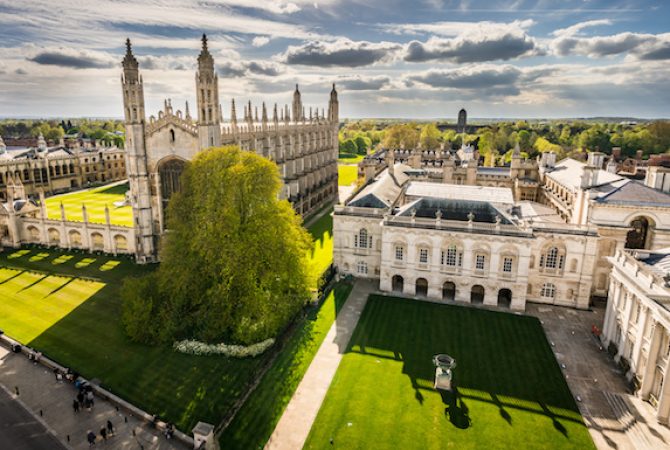Cambridge | International Education Consultants
February 15, 2021 2021-12-15 10:18Cambridge | International Education Consultants
Cambridge
Cambridge does not have a main campus, and its colleges and central facilities are scattered throughout the city. Undergraduate teaching at Cambridge is organised around weekly small-group supervisions in the colleges – a feature unique to the Oxbridge system
CAMPUS
UK
Estd 1209
Cambridge
Popular Majors
Arts & Humanities
Biology & Biochemistry
Life Sciences & Medicine
History
Anatomy & Physiology
Engineering & Technology
Rankings
QS Rankings
7
The World University Rankings
6
US News Rankings
9
Program and Curriculum
One of the most distinctive characteristics of our courses (also called Triposes at Cambridge) is that they cover the subject area very broadly in the initial years and then offer a wide range of options in which to specialise in the later years. Cambridge is known and respected across the globe for the excellence of our teaching and research, and the quality of our graduates. Not only are you taught in the lecture theatre by academics who are experts in their field, but our supervision system means that you receive more personal tuition from them too. We offer 30 undergraduate courses at Cambridge covering more than 65 subject areas.

NA
Median Starting Salary of Almuni
NA
Undergraduate Teaching Ranking
NA
Best Value School Ranking
Notable Alumuni
Charles Darwin - Often coined the father of modern biology, Darwin was sent to Cambridge by his father to study the Arts, in the hope that he might one day become an Anglican country parson.
Sir David Attenborough - The infamous broadcaster has collected 32 honourary degrees in addition to his bachelors in natural sciences from Clare College.
Stephen Hawking - Hawking returned to Cambridge post graduating to lecture, which he did for 30 years in the same post that had previously been occupied by the likes of Isaac Newton.
Prince Zeid bin Ra'ad - The Jordanian Prince gained a PhD from Cambridge before becoming the current United Nations High Commissioner for Human Rights.
Useful Information
What Cambridge look for in an undergraduate applicant
What we look for?
We're looking for students who really want to learn about the subject they've applied for and aren't just interested in the degree at the end, important though this is.There's no blueprint for an ideal Cambridge student and we want to give applicants as many opportunities as possible to demonstrate their strengths and potential.As our admissions decisions are based on academic criteria, we expect to see evidence of students’ super-curricular activities and wider engagement with their area(s) of academic interest, such as reading and other exploration relevant to the course applied for.
FAQ's
1. What is Cambridge famous for?
Almost everyone in the world knows about the legendary university – the University of Cambridge. Cambridge is the second-oldest university in the English-speaking world and the world’s fourth-oldest surviving university.
It is the fifth most popular university globally. Undergraduate courses in social sciences, engineering, sciences, arts and humanities are available at the university.
The thing that arouses the attention is that half of Cambridge’s graduates are foreigners. For international students, the institution offers a variety of courses tailored to their specific requirements and interests. Furthermore, the institution provides a Disability Resource Centre that aids differently-abled students to make the course more comfortable.
2. What is the acceptance rate of the University of Cambridge?
The acceptance rate of the University of Cambridge is 21%, and it is considerably higher than other universities.
3. What majors is Cambridge known for?
First of all, please note that, unlike other colleges, you do not pursue a major at the University of Cambridge. Instead, you simply choose a subject of your choice and get a degree.
4. What GPA is needed for Cambridge?
You need to maintain a GPA of at least 3.7 for getting an admission to the University of Cambridge.
5. Is it true that Cambridge and Oxford do not bother about extra-curricular activities when admitting students?
Cambridge and Oxford focus on candidates who are devoted to their choice of subjects and extraordinarily talented. Hence, your application should reflect your academic inclination towards that specific subject. They support extra-curricular if these activities back up your choice of subjects.
6. What is the application timeline and admission cycle in Cambridge?
Date | Application Timeline/Admission Cycle |
Early August | BMAT registration process begins |
Early September | UCAS apply opens |
1st October 2021 | BMAT registration last date for medicine applicants |
Early November | ELAT, BMAT and other pre-interview conductions |
First Three Weeks of December | Interviews will be conducted |
January 2022 | Winter Pool will be organised |
15th February 2022 | Choral Awards application last date |
28th February 2022 | Instrumental Awards application last date |
March 2022 | Deadline for second round applications |
May-June 2022 | Examinations will be conducted – A level and IB level examinations |
August 2022 | Examination results will be published |














